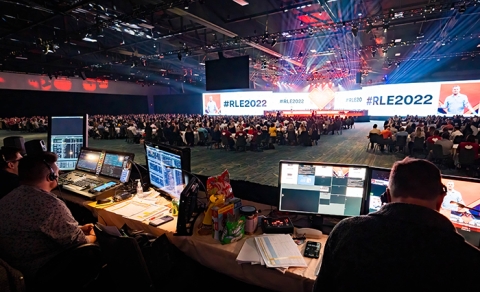Behind the Scenes: The Magic of Successful Event Productions
Behind the Scenes: The Magic of Successful Event Productions
Blog Article
Recognizing Exactly How Occasions Manufacturing Works: A Comprehensive Review of the Process
The details of event manufacturing need a methodical strategy that integrates several phases, each playing a vital duty in the overall success of an event. From the first preparation and concept advancement to the thorough coordination of logistics, every aspect has to align effortlessly to attain the desired outcome. Comprehending the subtleties of budgeting, resource allowance, and on-site monitoring is vital for any kind of professional in this area. As we explore these components additionally, it becomes apparent that the procedure is not just about implementation yet also regarding continual improvement and calculated analysis. What insights can we glean from each phase?
First Preparation and Principle Growth
Effective initial planning and idea advancement offer as the structure for effective occasions manufacturing. This phase entails specifying the occasion's objective, target market, and preferred results. A clear vision is necessary; it guides all subsequent decisions and helps align the group's initiatives towards an usual objective.
Throughout this stage, conceptualizing sessions can be vital. Engaging stakeholders, including customers, sponsors, and potential attendees, fosters a joint setting that creates innovative concepts. Furthermore, comprehensive market research study should be performed to recognize patterns, choices, and prospective difficulties.
Once the concept is established, it is important to produce an in-depth event synopsis. This outline must consist of the event's theme, format, and key tasks. Establishing a timeline is similarly important, as it assists to handle deadlines and tasks effectively.
Budgeting and Source Allocation
With a solid idea in location, interest needs to transform to budgeting and source appropriation, which are essential components in executing the event successfully. A well-defined budget serves as a roadmap, detailing all anticipated prices and available sources - Event Productions.
Source appropriation entails appointing both human and economic sources to numerous jobs and parts of the occasion. Prioritization is vital; important elements should receive sufficient financing while much less critical elements may need a much more traditional technique. Additionally, contingency preparation is critical-- alloting a portion of the spending plan for unanticipated expenditures can alleviate monetary dangers.
Furthermore, efficient communication among staff member concerning budget plan restrictions cultivates collaboration and development. This advertises the liable use resources and motivates imaginative remedies to remain within budget plan. Ultimately, a tactical strategy to budgeting and source allotment prepares for a successful occasion, allowing coordinators to concentrate on supplying an unforgettable experience for participants while preserving economic integrity.
Logistics and Control
Browsing the complexities of logistics and control is vital for the seamless implementation of any kind of event. This phase entails precise planning and organization to guarantee that all parts operate in harmony. Crucial element include place option, transportation arrangements, and the organizing of various activities.
This includes understanding the layout, access points, and available sources. Coordinating these components calls for cooperation with suppliers, vendors, and transport services to guarantee timely distributions and pick-ups.
An additional crucial aspect is the development of a detailed timeline that lays out all logistical elements leading up to the occasion. This this timeline functions as a roadmap, outlining essential milestones and target dates for jobs such as tools configuration, catering solutions, and audiovisual setups. Routine interaction with all stakeholders is vital to address any kind of possible problems proactively.
Implementation and On-Site Monitoring
Successful execution and on-site monitoring are important for transforming precise plans into reality throughout an event. This stage includes the seamless sychronisation of various components, making sure that every detail lines up with the recognized vision. On-site supervisors play a critical role, functioning as the central factor of communication amongst vendors, personnel, and stakeholders. Their ability to make real-time decisions can significantly influence the event's success.
A distinct schedule is necessary, working as a roadmap for all activities. Occasion supervisors should make certain that setup happens promptly, adhering to timelines for sound checks, providing distributions, and guest arrivals. Effective analytical abilities are also important; unforeseen obstacles can arise, requiring quick reasoning and flexibility to keep the event's flow.
This degree of interaction not only enhances the overall experience yet additionally mirrors the professionalism and trust of the occasion team. Ultimately, effective implementation and on-site administration hinge on detailed prep work, efficient interaction, and a commitment to delivering an extraordinary event for all entailed.

Post-Event Analysis and Comments
The culmination of any type of occasion exists not only in its execution yet also in the extensive evaluation that complies with. Post-event analysis is essential for figuring out the total success of the event and determining locations for renovation. This procedure typically includes event responses from numerous stakeholders, consisting of attendees, vendors, and staff member, to get a thorough viewpoint on their experiences.
To structure the evaluation, event organizers typically use studies and meetings, concentrating on crucial efficiency signs such as guest fulfillment, logistical performance, and spending plan adherence. Assessing this information permits organizers to analyze whether the occasion fulfilled its purposes and to comprehend the staminas and weaknesses of the execution.
By methodically dealing with feedback and carrying out changes, occasion experts can enhance their approaches, eventually click to investigate leading to more impactful and successful occasions. In conclusion, post-event analysis is a crucial action in the event manufacturing process that makes anonymous certain ongoing development and quality in future endeavors (Event Productions).
Conclusion

The intricacies of event manufacturing demand a methodical strategy that integrates several phases, each playing a crucial duty in the overall success of an event.With a strong principle in place, interest has to turn to budgeting and resource appropriation, which are important elements in implementing the event effectively.Source allocation involves designating both economic and human resources to different jobs and parts of the occasion. Ultimately, a calculated strategy to budgeting and resource allocation lays the groundwork for a successful occasion, making it possible for organizers to focus on delivering an unforgettable experience for guests while keeping economic honesty.

Report this page